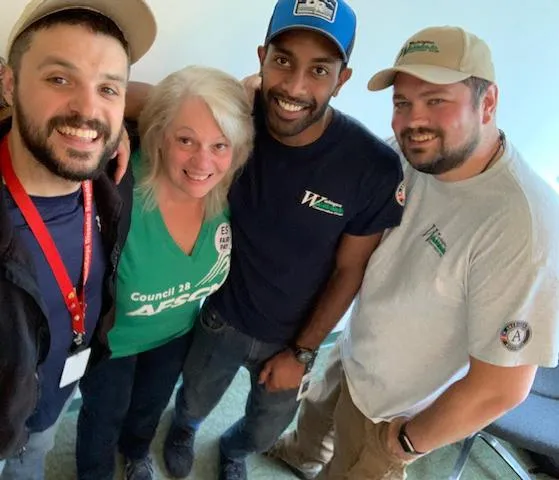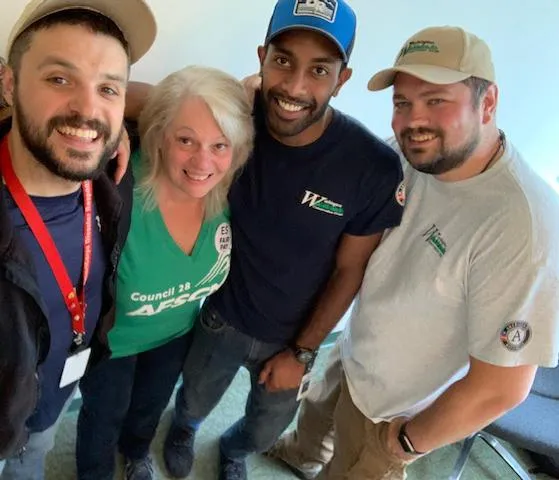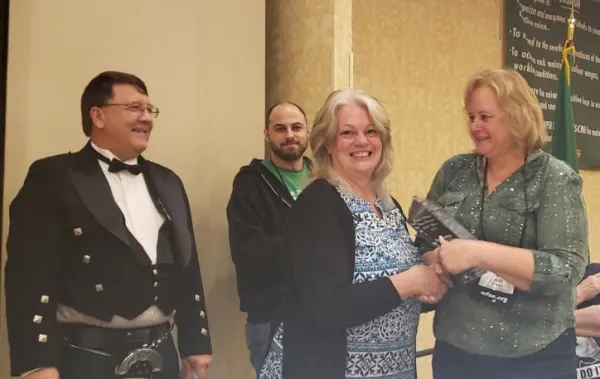Washington Conservation Corps Supervisors Win Big With WFSE Solidarity

Following a hard-fought campaign to organize a union with WFSE, the Department of Ecology’s Washington Conservation Corps (WCC) supervisors won an arbitration granting them almost two years of per diem back pay.
Michael Franks, a WCC shop steward and WFSE Local 872 treasurer, played a critical role in the process.
“With last week’s win, more folks are beginning to understand the union difference,” he said.
[caption caption="WCC supervisors and Ecology Steward Pat Bailey. Michael Franks is on the right side." align="center"]
Counselors, Teachers, and Team Leaders
The WCC supervisors’ role isn’t to supervise other Ecology employees—instead, they run an award-winning program for the agency’s young Americorps volunteers.
Teams are assigned to work-intensive projects, building trails, maintaining park buildings, conducting fishery research, and more. Sometimes the crews even assist other states with disaster response.
On every assignment, the supervisors are responsible for the volunteers’ safety. They function as counselors, teachers, and team leaders. Despite the size and scope of their role, they’re some of the lowest-paid Department of Ecology employees and treated as outsiders in their agency.
“We were like a separate pet project that had different rules from everyone else,” said Franks.
“I wanted to help my fellow supervisors have a say.”
Managers at the agency struggled to explain why the WCC supervisors were excluded from the per diem allowance granted to other Ecology employees.
Some managers suggested that the supervisors did not need per diem. Instead, they suggested that supervisors pool their $20 daily food allowance with the Americorps volunteers and teach them to prepare communal meals on a budget. However, all other Ecology employees on overnight travel are entitled to per diem.
“It was getting to the point where we were tired of not having any voice in things that would help our program run better,” said Franks.
The Power of a Collective Bargaining Agreement
Pat Bailey, WFSE Local 872 Chief Shop Steward and 2019 Laurie Merta Steward of the Year, agreed that things needed to change.

“Other Ecology employees were 2000 percent on board with our fight,” Bailey said.
“They felt that ‘these are our brothers and sisters and should be treated like any other state employee’. This group of people have great respect from their peers. Everyone was aligned with making sure this was a priority.”
Just two days after Franks began speaking to his coworkers about the benefits of joining WFSE, more than fifty percent of the unit voted to unionize. Thanks to the hard work of Franks, Bailey, and others in the unit, they were recognized by the state as union members in December 2018.
With the power of a collective bargaining agreement (CBA), the supervisors decided to tackle a major sore spot—the inadequate meal allowance.
The newly minted team knew they had grounds for a major grievance. They turned to union solidarity for support.
“When we learned that WFSE had voted pretty much unanimously that they had our back in this, that was the happiest moment out of two years,” said Franks.
Finally, with WFSE’s support, the grievance went to arbitration. Last week, the decision came back—in the supervisors’ favor.
We Haven’t Lost One Yet
Franks noted that the back pay hasn’t been the only benefit of joining WFSE.
“They always had meetings with the supervisors asking, ‘How can we make the program better?’ We gave them so many ideas, but they were written down and thrown away. Now that we’re a union, they have to listen,” he said.
Turning to the future, Franks and Bailey say the next fight will be to get this position reclassified to rectify low pay and poor treatment.
“The WCC supervisors need an across-the-board raise and to make their way into an environmental category,” Bailey said.
Bailey will retire next year, but she leaves a powerful legacy.
“At our local, 872, we don’t bring frivolous grievances,” she said. “Management needs to know that we’re willing to take this to the mat and that we’re serious.”
Pausing to reflect, she said, “We haven’t lost one yet.”
